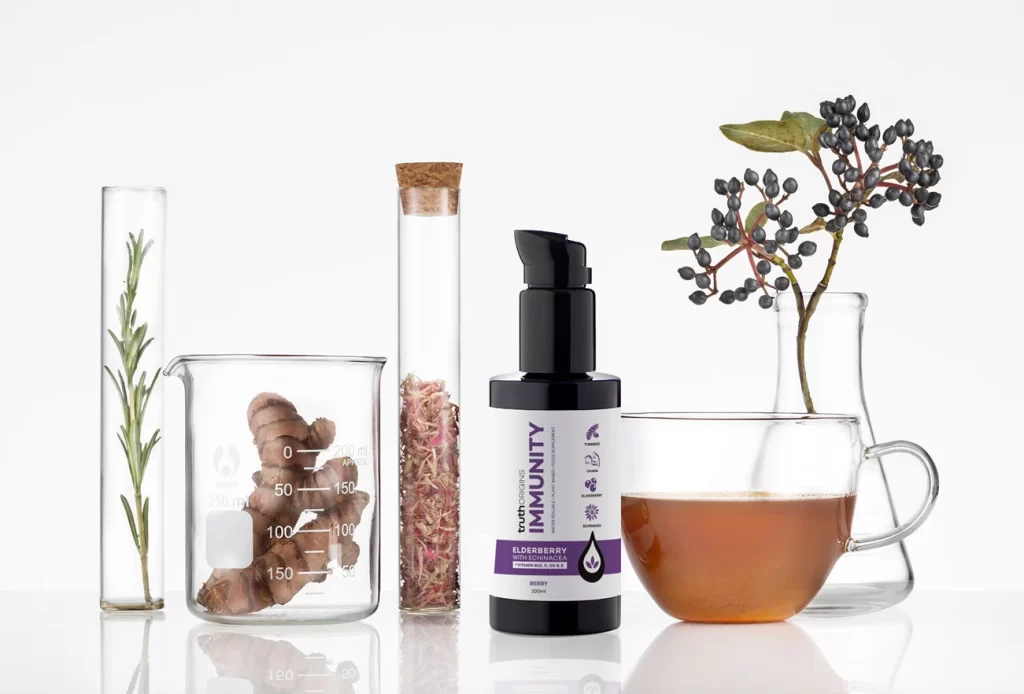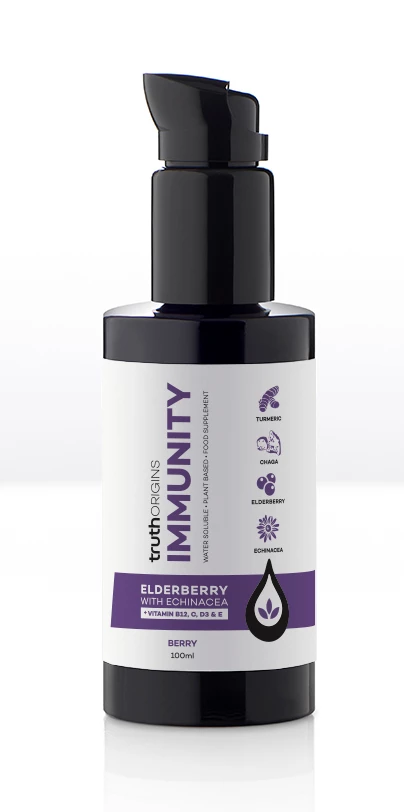Introducing our newest product: Immunity
Let’s take a look at our exciting new member of the Truth family!
– Dr. Harrison Weisinger

If nothing else, the events of this year have probably increased the average person’s awareness of the wonders and frailties of the human immune system more than at any other time in history. Once confined to the clinical and scientific literature or medical school, terms like serology, antibodies and herd immunity are now part of general parlance.
It’s also fair to say that most people now appreciate the importance of having a fully functional immune system, but also to doing what they can to bolster it. With this in mind, the team at Truth are excited to announce our latest product: simply called “Immunity”.
The immune system is often described as having two components: innate immunity and acquired immunity…

Innate Immunity
Innate immunity is the system we’re born with. It comprises the ability to respond to invasion by foreign organisms (say, bacteria or viruses) by attracting cells and fluid to the site of invasion. The innate immune system also has specialised white blood cells that are able to identify and remove foreign substances present in organs, tissues, blood and lymph. Finally, the innate immune system is able to trigger the second component of the immune system: the adaptive immune system.
Adaptive Immunity
Adaptive immunity begins to develop after we’re born. Unlike innate immunity, adaptive immunity is highly specific to particular pathogens. Specialised white blood cells, known as T-cells and B-cells, are responsible for our ability to develop immunity after prior exposure to an invader. Occasionally, the adaptive immune system can be “tricked” – examples of this are cancerous cells, autoimmune conditions like Coeliac Disease and hay-fever. Vaccination takes advantage of adaptive immunity by developing a ready-to-roll army of immune cells that become activated by the appearance of the true invader.
Both innate and adaptive immunity function without instructions and just as well! Generally speaking, we don’t need to do anything to help our immune system to function. Having said that, there are a range of naturally occurring substances that have been found to improve our resistance to infection. More on these in a minute.
Finally, we all know that immunity can be reduced by a range of environmental and lifestyle challenges. I’ve written this before, but the importance of the following cannot be over-stated:
1. Sleep.
Sleep deficiency predisposes to a range of illnesses, some acute, some chronic. The number one reason for sleep deficiency, believe it or not, is going to bed too late.
2. Regular exercise.
It is impossible to summarise the list of benefits resulting from regular exercise, but it improves physical resilience and mental health, both of which, in turn, boosts immunity.
3. Good food choices.
Though I’m pretty good on balance, I’m definitely no saint when it comes to food choices. I love nachos. Enough said. But – there are a range of vitamins and micronutrients that are, by definition, essential for life and immunity. Eating plenty of fresh fruit and vegetables (and meat and fish if you’re a meat and fish eater) is one way to take these on board. For those that find shopping around the edges of the supermarket and finding time for food prep a challenge, there are always supplements like the ones we make! It’s no accident that our core supplements are essential vitamins and nutrients such as Vitamin C, Vitamin D, and Omega-3 fatty acids.

4. Stress.
I know it’s pointless to advise you to avoid stress, so I won’t. But in this section, I want to talk about an emerging field looking into “eustress” – conditions that cause physical stress but elicit a positive physical benefit. For instance, hard exercise, such as high intensity intervals reduce immunity initially but within a day or so, actually improve it.
Similarly, research into traditional sauna (say exposure to 80 degrees for 20 minutes or more, 4-7 days a week) as well as extended fasting (between 1 and 3 days at a time) actually reduces all-cause mortality and increases lifespan. No doubt, immunity has something to do with this.
OK – it’s time to tell you about our latest product: Immunity! Having scoured the literature for natural, plant-based ingredients that have been found to help with immunity, here’s what we’ve put in the bottle:
Curcumin
My favourite ingredient! The list of benefits for this compound goes on and on, which is why there have been over 20,000 articles published in the scientific literature.
Just some of the immune system benefits of curcumin show that is:
- Helps to maintain the efficacy of the immune system.
- Helps to maintain resistance to allergies.
- Has significant antioxidant properties.
- Helps maintain the health of the lungs and upper respiratory tract.
Echinacea
There is evidence that echinacea supports the immune system, the body’s natural defence and can contribute to upper respiratory tract health. For instance, one study found that 9% less people taking echinacea for 8 weeks had a cold during that time (65% of people taking echinacea caught a cold in the 8 weeks, versus 74% of those in the placebo group). A separate study made a similar observation after nasal inoculation with rhinovirus: 58% of those taking echinacea developed an infection versus 82% of those not taking echinacea. Also, in this study, the median duration of infection was reduced by 2 days (4.5 days versus 6.5 days).
Elderberry
Elderberry is a member of the honeysuckle family. Extracts of the berries are used primarily as antiviral agents for colds, influenza, and Herpes virus infections. Research has found that elderberry may help protect your cells from oxidative stress. Constituents of the berries include the flavonoid quercetin as well as vitamins A and C.
Acerola Cherry
Acerola cherry is best known for being extremely rich in vitamin C. It is a plant native to tropical regions in the Western Hemisphere. Vitamin C is an essential nutrient and vitamin that is water-soluble, and is not stored in the body, so you need to take a daily source of water-soluble vitamins. Amongst its role in collagen formation and and iron absorption, Vitamin C has been shown to contribute to:
- the normal function of the immune system
- the protection of cells from oxidative stress
- normal functioning of the nervous system
Zinc
This trace element is crucial for human health. Its importance is basically on par with iron, as reflected in the fact that there are similar amounts of zinc and iron stored in the body. Zinc is contained within about 250 proteins, many of which are key enzymes in the body. It plays a key role in gene function and cell division.
Even mild deficiency leads to a host of problems. Zinc supplementation is very important during pregnancy for women. Zinc has also commonly been used to treat the common cold as it is know to help your immune system.

Vitamin B12
B12 absorption requires something called “intrinsic factor” which is produced by the stomach. Unfortunately, inadequate gastric acid secretions or antibodies to intrinsic factor leads to B12 deficiency – and this is estimated to be up to 10% of the population, depending on age.
B12 is known to play an important role in immunity, and help with normal psychological and cognitive function. It can only be stored in small quantities in the liver which is why we feel it is an important addition to Immunity.
Vitamin D
We have gone over the importance of Vitamin D many times, and there is good reason! Many people are unfortunately not receiving enough exposure to Vitamin D which is essential for dietary calcium absorption from the gut and calcium, in turn, is critical for a variety of physiological processes including the function of muscles, the brain and the normal functioning of the immune system.
LIKE THESE ARTICLES?
STAY UP-TO-DATE
Join the Truth Origins club to stay up-to-date on our latest articles, blog posts, updates and exclusive discounts. You’ll also receive 10% OFF your first purchase for joining.


